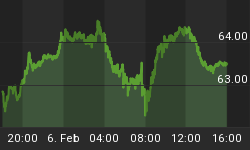
Markets can lose their equilibrium from a variety of factors. One of my first notes in March attempted to describe that dynamic in a series of charts titled, Where Reflexivity Meets Equilibrium.
One condition that can destabilize a market is the confluence of exogenous pressures harmonically acting against a markets price structure at precisely the wrong moment. The 1987 crash is one example of a market that was clearly ahead of itself in price over time and vulnerable to missteps in liquidity and mass psychology.
The S&P downgrade of US debt this Friday evening, after the market swooned more than 7% for the week - has the potential to destabilize the system enough to produce another crash. What should mitigate that potential is the fact that clearly the market got wind of this decision much earlier than Friday afternoon and started pricing it in - and the emergency measures now being considered in Europe this afternoon. It truly is a barbell of extremes in the currency equation, with timings so extraordinary that the conspiracy theorist will be out spinning their tales that it was preconceived and directed to balance the equation and save the euro itself.
My own personal (perhaps official is more appropriate) opinion is the S&P acted in a egregiously irresponsible manner in releasing the downgrade at such a fragile moment for the markets. To be honest, my first impression Friday morning of the rumor (as someone who monitors the technical structure of the market) was, "No way they would dare do that here." Certainly Congress forced their hand and to a large extent and I agree with much of their communique directed at our broken political system and what that means towards stability and market expectations. However, I could not think of a worse moment to spook a market that was already digesting real sovereign debt issues from across the Atlantic (wink, wink) and technically sitting on precarious support.
Between now and the open Monday morning, all eyes will rest on the emergency ECB conference underway and to what degree they will be willing to buy their sovereign debt and give a new lease to the European banking system. In this respect, in proves on a relative scale that Bernanke was clearly ahead of the curve in providing the extraordinary capital measures needed to save the system. Certainly we can all wax poetic at the imperfect nature of the financial infrastructure and how it needs to be amended at so many levels. But at the end of the day the pragmatic old aphorism of, "There are no atheists in foxholes - and no Libertarian's in financial crises" still applies - because we are still going through the crisis itself.
A parting thought with regard to the broad brush impression of the markets price structure here is the decline last week to ~1200 on the SPX on the daily charts came to rest on the bottom rail of the expanding range I established on April 1st of this year (see Here). It will be interesting to see if the market balances the action it provided at the top of the range (bull trap, see Here and Here) with a bear trap (or six) on the bottom of the range.

Until next time - keep your wits, don't panic and stay frosty.
Positions in UUP, GLL & TNA
Trades since Inception Trade Transparency
I just joined Twitter. All my trades and occasional market musings are disclosed in real-time here.















